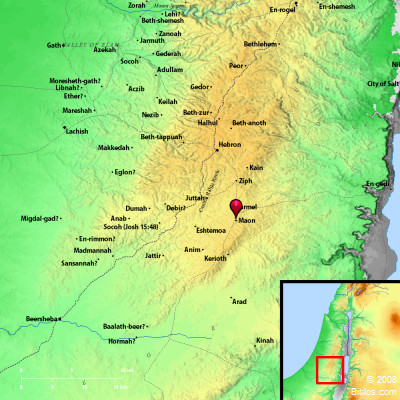Atlas  Maon and surrounding region
Maps Created using Biblemapper 3.0Additional data from OpenBible.infoOccurrences Joshua 15:55 Maon, Carmel, Ziph, Jutah, 1 Samuel 23:24 They arose, and went to Ziph before Saul: but David and his men were in the wilderness of Maon, in the Arabah on the south of the desert. 1 Samuel 23:25 Saul and his men went to seek him. When David was told, he went down to the rock, and stayed in the wilderness of Maon. When Saul heard that, he pursued after David in the wilderness of Maon. 1 Samuel 25:2 There was a man in Maon, whose possessions were in Carmel; and the man was very great, and he had three thousand sheep, and a thousand goats: and he was shearing his sheep in Carmel. Encyclopedia MAON; MAONITESma'-on, ma'-on-its, ma-o'-nits (ma`on; Septuagint: Codex Vaticanus Maor, Maan; Codex Alexandrinus Maon):
(1) A town in the mountain of Judah named along with Carmel and Ziph (Joshua 15:55). It appears again as the home of Nabal, the great flockmaster (1 Samuel 25:2). In the genealogical list of 1 Chronicles 2, Maon stands as the "son" of Shammai and the "father" of Beth-zur (2:44, 45). This evidently means that Shammai was the founder of Maon. About a mile South of el-Karmil, the ancient Carmel, lies Tell Ma`in. This may be confidently identified with Maon, the radicals of the names being the same. It suits the requirements of the narratives in other respects, being near to Carmel, while the surrounding wilderness is still used as the wide pasture land for multitudinous flocks. In this district, the wilderness of Maon, David was hiding when his whereabouts was betrayed to Saul by the men of Ziph (1 Samuel 23:24 f), and only a timely raid by the Philistines delivered him out of that monarch's hands (1 Samuel 23:27).
(2) (Madiam): Maon is named along with the Zidonians and Amalek as having at some time, not mentioned, oppressed Israel (Judges 10:12). The Septuagint "Midian" has been accepted by some scholars as restoring the original text, since, otherwise, the Midianites remain unmentioned. But the Maonites are evidently identical with the Meunim of 1 Chronicles 4:41 (Revised Version), the pastoral people destroyed by Hezekiah. In 2 Chronicles 20:1 the King James Version, instead of "other beside the Ammonites" we must read "some of the Meunim," as associated with the Ammonites in the battle with Jehoshaphat. Against them also Uzziah was helped of God (2 Chronicles 26:7). They are included among the inhabitants of Mt. Seir (2 Chronicles 20:10, 23), so that an Edomite tribe is intended. It is natural to connect them with Ma`an, a place on the great pilgrimage road, and now a station on the Damascus-Hejaz Railway, to the Southeast of Petra. It undoubtedly represents an ancient stronghold.
The Maonites appear in the lists of those who returned from exile (Ezra 2:50, the King James Version "Mehunim," the Revised Version (British and American) "Meunim"; Nehemiah 7:52, "Meunim"). These may possibly be the descendants of prisoners taken in the wars of Jehoshaphat and Uzziah, to whom menial tasks may have been appointed in the temple services.
W. Ewing |
    |




